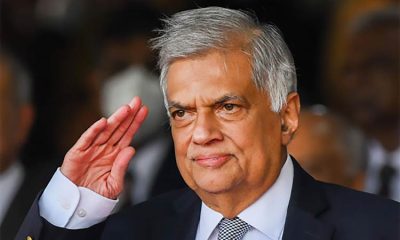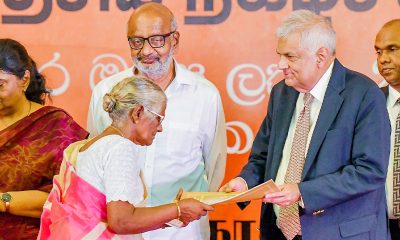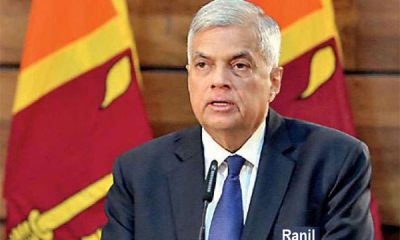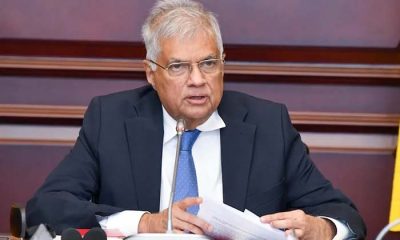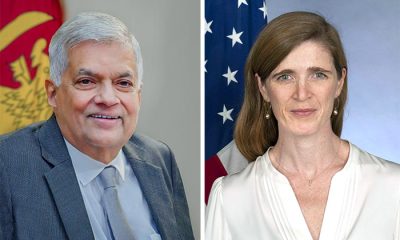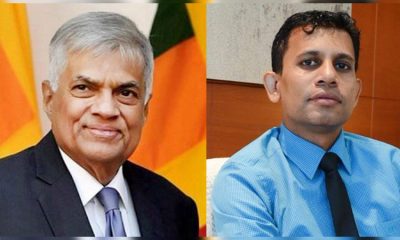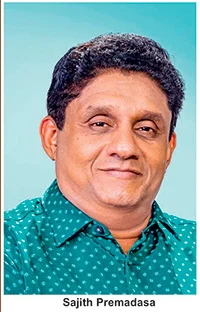Midweek Review
Prez warns of hard times ahead

Why did former President Sirisena vacate the Paget Road residence, having made it part of his ‘deal’ with the UNP?
A three-judge bench of the Supreme Court, comprising Justices Priyantha Jayawardena, Gamini Amarasekara, and Kumuduni Wickremasinghe, having examined the arguments put forward by both the petitioner and respondent parties, issued an interim order on March 29, 2022, suspending the decision of the Cabinet-of- Ministers to allow former President Maithripala Sirisena to continue use of the residence occupied by him at Paget Road.
By Shamindra Ferdinando
The inordinate delay in filling the remaining vacancies in the Cabinet-of-Ministers underlines the continuing turmoil, within the Wickremesinghe-Rajapaksa government, grappling with the worst ever economic-political-social crisis in post-independence Sri Lanka.
UNP leader Wickremesinghe, in spite of having only one National List slot, polled 134 votes in Parliament, whereas his chief rival, Dullas Alahapperuma, secured 82 votes in the July 20, 2022, contest that elected him as the 8th executive president. Wickremesinghe’s job is to complete the remainder of Gotabaya Rajapaksa’s five-year term won at the last presidential election held in November, 2019.
Having comfortably secured the presidency in the first such vote by members of Parliament, Wickremesinghe appointed his first Cabinet on July 22, 2022. The first Cabinet consisted of 18 lawmakers. Twelve vacancies exist as in terms of the Constitution, 30 Cabinet and 40 non-Cabinet ministers can be appointed regardless of the size of the ruling party/ruling coalition.
The Sri Lanka Podujana Peramuna (SLPP) secured the lion’s share of portfolios though the Mahajana Eksath Peramuna (MEP) received the premiership.
Wickremesinghe had no option but to go ahead with the appointment of the Cabinet after the main Opposition Samagi Jana Balavegaya (SJB) declined to join what Wickremesinghe called an all-party government.
But Wickremesinghe, in his capacity as the Premier (April 12, 2022-July 20, 2022) managed to engineer two crossovers from the Opposition (Galle District SJB MP Manusha Nanayakkara and SJB National List MP Harin Fernando).
Wickremesinghe faced daunting challenges, on multiple fronts as his government struggled to avoid Local Government polls, scheduled for early this year. In spite of its leader being the President, who is also the Commander-in-Chief of the Armed Forces as well as the Defence and Finance Minister, the UNP is in a precarious situation. Restricted to just one National List MP (Wajira Abeywardena), the UNP lacks the organisational strength to conduct a Local Government election campaign.
Wickremesinghe’s sponsor, the SLPP, though still the largest party in Parliament, has been weakened by nearly two dozen desertions.
However, Wickremesinghe as wily as his uncle, the late President Jayewardene, remains confident of pulling through.
During a brief informal chat with Editor of The Island Prabath Sahabandu, Editor of The Sunday Island Manik de Silva, Irida Divaina Editor, Udesh Sanjiva Gamage, Divaina Editor, Narada Nissanka, and the writer, Associate Editor of The Island, at the President’s official residence at Mahagama Sekera Mawatha (formerly Paget Road), Colombo 07, the President explained his position on a range of issues.
At that onset of the 40-minute conversation, President Wickremesinghe dealt with the economic crisis and how it could affect the country this year and possible scenarios, depending on the global situation.
Wickremesinghe warned of imminent hike in electricity tariffs while suggesting the fuel and power crisis couldn’t be tackled with a two-hour-and-20-minute power cut. The UNP leader recalled how successive governments had aggravated the power crisis by refusing to increase electricity tariffs since 2015.
Wickremesinghe, however, cannot absolve himself of responsibility for the current predicament as he served the Yahapalana government, as the Prime Minister, from 2015 to 2019.
The President found fault with the media for discouraging successive governments from increasing electricity tariffs.
The President separately received groups of senior representatives of both the print and electronic media at his official residence on Poya Day (06).
Second Prez at Paget
Road residence
It would be pertinent to discuss the circumstances Wickremesinghe moved to Paget Road residence, previously occupied by former President Maithripala Sirisena.
At the tail end of a politically turbulent five-year term, Sirisena, in his capacity as head of the Cabinet-of-Ministers, secured approval for him to retain his official residence, following the end of his term. Wickremesinghe served as the Prime Minister, at that time, though the proposal was made by the late Mangala Samaraweera, the then Minister of Foreign Affairs. The Janatha Vimukthi Peramuna (JVP) raised this issue in Parliament as to whether it would have been fair for the former President to retain his official residence, though he was constitutionally entitled to an official residence, along with security, and a pension, at the end of his term.
Such extravagant facilities granted to ex-Presidents and their spouses should be re-examined against the backdrop of the current financial crisis. There should be consensus among political parties that such benefits entirely depend on their retirement. Twice President Mahinda Rajapaksa and President Sirisena now serve as members of Parliament. Perhaps, ex-Presidents should be constitutionally barred from seeking office as part of the overall measures to improve the political culture here.
A violent group executed a meticulously planned attack on the then Prime Minister Ranil Wickremesinghe’s private residence at 5th Lane, Kollupitiya, on the evening of July 09, hours after President Gotabaya Rajapaksa fled Colombo as rioters stormed the President’s House. The group stormed the well-guarded residence in the absence of clear instructions from the military and law enforcement higher-ups. The group mounted the attack after Wickremesinghe stoutly refused to resign. Had Wickremesinghe, in his capacity as the Premier, given in, the protest campaign could have taken a turn for the worse. Perhaps, Wickremesingthe decision to stay put and stand up to the Aragalaya storm troopers helped thwart their plans to storm the Parliament complex.
When the politically motivated gang destroyed Wickremesinghe’s private residence, he moved to the vacant Paget Road residence.
Why did former President Sirisena vacate the Paget Road residence, having made it part of his ‘deal’ with the UNP? Obviously, the SLFP leader’s intention was to occupy the place for the rest of his life. There cannot be any ambiguity about Sirisena’s intentions as far as the Paget Road residence is concerned. But thanks to a case filed by Executive Director of CPA, Dr. Pakiasothy Saravanamuttu, Maithripala Sirisena left the place in May 2022.
A three-judge bench of the Supreme Court, comprising Justices Priyantha Jayawardena, Gamini Amarasekara, and Kumuduni Wickremasinghe, having examined the arguments put forward by both the petitioner and respondent parties, issued an interim order on March 29, 2022, suspending the decision of the Cabinet-of-Ministers to allow former President Maithripala Sirisena to continue use of the residence occupied by him at Paget Road.
Prez confident of China,
India consensus
Making reference to Gross Domestic Product (GDP) in 2022 (minus 11) as well projected GDP this year (minus 04), President Wickremesinghe underscored the fact that Sri Lanka’s recovery depended on external factors, the difficulty in overcoming the ongoing crisis and how global issues could influence developments here. Wickremesinghe was referring to the much anticipated consensus with India and China in respect of the debt restructuring plan.
India had never been part of such a plan, President Wickremesinghe declared, referring to the USD 3.5 bn made available by India last year to meet the developing crisis here. The President acknowledged China’s dilemma in throwing a lifeline as it had to consider the implications of such a move.
According to Wickremesinghe, China deliberated the consequences of setting a precedent. The President explained how finalisation of USD 2.9 bn IMF facility spread over a period of four years could infuse confidence among all concerned.
Commenting on the agricultural sector, the President asserted that a bumper harvest was expected during the Maha season. He also mentioned substantial rice imports last year.
The President explained the adverse impact the loss-making Ceylon Petroleum Corporation (CPC), Ceylon Electricity Board (CEB) and the national carrier SriLankan Airlines was having on two State Banks and the subsequent consequences for the Central Bank.
We sought a clarification from the President as regards him calling for explanation from the CPC and SriLankan Airlines over the payment of bonuses last year, contrary to specific instructions issued by the government. Asked whether the Chairmen of the CPC (Mohamed Uvais Mohamed) and SriLankan Airlines (Ashok Pathirage) responded to his call for explanation, the President said they were yet to do so. The President asserted that SriLankan Airlines management granted bonuses ahead of privatisation of the airline. The CPC, too, had responded the same way, he added.
Responding to a query on Chairman of the Public Utilities Commission Janaka Ratnayake’s opposition to the proposed tariff hike, the President reiterated the official, who owned buildings, was personally affected by increaes in electricity prices. The President opined that Ratnayake couldn’t serve as Chairman of the Commission due to a conflict of interest.
Asked whether Ratnayake could hinder government moves, the President said the official couldn’t do. He said there was a dispute between Ratmayake and PUCSL Director General Damitha Kumarasinghe.
Litro Chairman Muditha Peiris received the appreciation of President Wickremesinghe after we commented on his handling of the crisis quite efficiently. (However, serious allegations directed at Litro over the procurement process at a time when the country experienced a balance of payment crisis cannot be ignored. The top Litro management has denied accusations made by the Parliamentary Committee on Public Enterprises, during Prof. Charitha Herath’s tenure as the watchdog’s Chairperson).
Purchase of paddy halted
President Wickremesinghe suggested placing Divisional Secretaries (Assistant Government Agents) in charge of a paddy purchase scheme when we pointed out that though the government expected a bumper harvest this Maha season, farmers were up in arms over the failure on the part of the Paddy Marketing Board (PMB) to perform its primary duty last year. The President asserted that the PMB should be actually closed down.
We pointed out that over Rs 1 bn, in fixed deposit, belonging to the PMB, hadn’t been utilised, in spite of growing demands for government intervention. We also pointed out that State Finance Minister, Ranjith Siyambalapitiya, is on record as having said that the Treasury lacked the wherewithal to launch a paddy purchasing scheme.
President Wickremesinghe stressed the need for a ‘system change.’ The Sri Lankan leader stressed the need for a total overhaul of the system.
Wickremesinghe cited the crisis in the entire education system as a case in point. The need for setting up more government and private universities and the possibility of attracting foreign students, too, was discussed.
Asked whether the government was prepared to review the policy of having a large number of holidays as part of the overall system change President Wickremesinghe acknowledged the need to do so. Wickremesinghe said that he was ready to discuss the issue with religious leaders in an effort to reach a consensus on the reduction of holidays.
The President also stressed the need to streamline Railways and the Central Transport Board after we pointed out how railway services were deliberately disrupted, claiming staff shortage, following the retirement of some of its workers, in line with the government policy.
We also sought a clarification from the President, who also served as the Finance Minister, regarding the inordinate delay in recovering taxes, interests, etc., amounting to Rs 763 bn as disclosed by COPA (Committee on Public Accounts) Chairman Kabir Hashim, while the new and additional taxes were slapped on the entire population. The President responded by saying those were ‘old taxes.’ The President expressed dissatisfaction at the overall revenue collection mechanism. “Revenue should be about 18 to 19 percent of the GDP in a social market economy,” President Wickremesinghe said, while pointing out the requirement to gradually address issues at hand, pertaining to the economy.
President Wickremesinghe, in response to our query regarding accountability issues, dealt with land, PTA, full implementation of the 13th Amendment, and releasing of those who had been in detention for more than 14 years.
The President expressed the belief that Diaspora pressure could ease when his government addressed those issues. That could influence the international community, the President said.
The President was responding to our suggestion that the government should ask for an end to the Geneva process, targeting the war-winning Sri Lankan military, in parallel to the abolition of the PTA, and release of terrorist suspects. We questioned the legitimacy of war crimes accusations against the military after the Tamil community overwhelmingly voted for the war-winning Army Commander, then General Sarath Fonseka, at the 2010 presidential election.
President Wickremesinghe said pressure would begin to ease once the government did away with the PTA and released terrorists suspects.
Commenting on the continuing controversy over the scheduled Local Government polls, President Wickremesinghe said the members of the Election Commission were sharply divided on the timing of the LG polls.
Wickremesinghe indicated that the time was not opportune for Local Government polls, whereas his mandate was to run the country for the next two years.
While tackling national issues, President Wickremesinghe has to be mindful of other problems that may further undermine public faith in the political party system.
A glaring example is allegations made against Ashu Marasinghe. The resignation of Wickremesinghe’s Parliamentary Affairs Secretary, following allegations made by his ex-paramour, Adarsha Karadhana, of him sexually abusing a pet dog. Former MP Marasinghe has immediately initiated legal action against Karadhana and ex-lawmaker Hirunika Premachandra.
The Ashu Marasinghe affair has further weakened public confidence in a corrupt, irresponsible and reckless political party system, struggling to cope up with the worst ever political-economic-social crisis.
Midweek Review
BASL fears next set of civil society representatives might be rubber stamps of NPP

CC in dilemma over filling impending vacancies
Sajith Premadasa
Amidst a simmering row over the controversial move to have Deshabandu Tennakoon as the IGP at the time of crucial presidential election, Opposition Leader Sajith Premadasa alleged: “The Speaker sent a letter to the President, recommending the appointment of Deshabandu Tennakoon as IGP. He distorted the Constitutional Council ruling by interpreting the two abstaining votes of civil society members as votes against Deshabandu and used his casting vote to recommend Deshabandu as the Constitutional Council decision. It is on the basis of the Speaker’s letter that the President made the appointment. The Speaker has blatantly violated the Constitution
.”
Speculation is rife about a possible attempt by the ruling National People’s Power (NPP) to take control of the 10-member Constitutional Council (CC). The only way to take command of the CC is to appoint those willing to pursue the NPP agenda as civil society representatives.
Against the backdrop of the NPP’s failure to obtain CC’s approval to finalise the appointment of the Auditor General, the government seems hell-bent on taking control of it. Civil society representatives, namely Dr. Prathap Ramanujam, Dr. (Mrs.) Dilkushi Anula Wijesundere and Dr. (Mrs.) Weligama Vidana Arachchige Dinesha Samararatne, whose tenure is coming to an end in January, blocked President Anura Kumara Dissanayake’s nominee receiving the AG’s position. They took a courageous stand in the greater interest of the nation.
Chulantha Wickramaratne, who served as AG for a period of six years, retired in April 2025. Following his retirement, President Anura Kumara Dissanayake first nominated H.T.P. Chandana, an audit officer at the Ceylon Petroleum Corporation. The CC rejected the nomination. Subsequently, President Dissanayake appointed the next senior-most official at the National Audit Office (NAO) Dharmapala Gammanpila, as Acting Auditor General for six months. Then, the President nominated Senior Deputy Auditor General L.S.I. Jayarathne to serve in an acting capacity, but her nomination, too, was also rejected.
Many an eyebrow was raised when the President nominated O.R. Rajasinghe, the Internal Audit Director of the Sri Lanka Army, for the top post. As a result, the vital position remains vacant since 07 December. Obviously the overzealous President does not take ‘No’ for an answer when filling key independent positions with his minions
The Bar Association of Sri Lanka (BASL) in a letter dated 22 December, addressed to President Dissanayake, who is the leader of the NPP and the JVP, Prime Minister Dr. Harini Amarasuriya, Speaker Dr. Jagath Wickremaratne and Opposition Leader Sajith Premadasa emphasised their collective responsibility in ensuring transparency in the appointment of civil society representatives.
Cabinet spokesperson and Health and Media Minister, Dr. Nalinda Jayatissa, is on record as having emphasised the urgent need to finalise the appointment. Minister Jayatissa alleged, at the post-Cabinet media briefing, that the President’s nominations had been rejected without giving explanation by certain members, including three representatives of civil society.
Parliament, on 18 January, 2023, approved the former Ministry Secretary Dr. Ramanujam, former Chairperson of the Sri Lanka Medical Association Dr. Wijesundere, and Dr. Samararatne of the University of Colombo as civil society representatives to the CC.
They were the first post-Aragalaya civil society members of the CC. The current CC was introduced by the 21 Amendment to the Constitution which was endorsed on 31st of October, 2022, during a time of grave uncertainty. UNP leader Ranil Wickremesinghe, who had been elected by the SLPP to complete the remainder of ousted President Gotabaya Rajapaksa’s five-year term, sought to manipulate the CC. Wickremesinghe received the SLPP’s backing though they fell out later.
During Wickremesinghe’s tenure as the President, civil society representatives earned the wrath of the then Rajapaksa-Wickremesinghe government by refusing to back Deshabandu Tennakoon’s appointment as the IGP. The then Speaker Mahinda Yapa Abeywardena was accused of manipulating CC’s ruling in respect of Deshabandu Tennakoon to suit Wickremesinghe’s agenda.
Amidst a simmering row over the controversial move to have Deshabandu Tennakoon as the IGP, at the time of crucial presidential election, Opposition Leader Sajith Premadasa alleged: “The Speaker sent a letter to the President, recommending the appointment of Deshabandu Tennakoon as IGP. He distorted the Constitutional Council ruling by interpreting the two abstaining votes of civil society members as votes against Deshabandu and used his casting vote to recommend Deshabandu as the Constitutional Council decision. It is on the basis of the Speaker’s letter that the President made the appointment. The Speaker has blatantly violated the Constitution.”
The NPP realises the urgent need to neutralise the CC. The composition of the CC does not give the Opposition an opportunity to challenge the government if the next three civil society representatives succumb to political pressure. The Speaker is the Chairman of the CC. The present composition of the Constitutional Council is as follows: Speaker (Dr) Jagath Wickramaratne, ex-officio, PM (Dr) Harini Amarasuriya, ex-officio, Leader of the Opposition Sajith Premadasa, ex-officio, Bimal Rathnayake, Aboobucker Athambawa, Ajith P. Perera, Sivagnanam Shritharan, Dr Prathap Ramanujam, Dr Dilkushi Anula Wijesundere and Dr Dinesha Samararatne.
In terms of Article 41E of the Constitution, the CC meets at least twice every month, and may meet as often as may be necessary.
The failure on the part of the NPP to take over Office of the AG must have compelled them to explore ways and means of somehow bringing CC under its influence. The end of the current civil society members’ term, has given the government a chance to fill the vacancies with henchmen.
BASL’s letters that dealt with the appointment of civil society representatives to the CC and the failure to appoint AG, both dated 22 December, paint a bleak picture of the NPP that throughout the presidential and parliamentary polls last year assured the country of a system change. The NPP’s strategy in respect of filling the AG’s vacancy and possible bid to manipulate the CC through the appointment of civil society representatives reminds us of the despicable manipulations undertaken by previous governments.
An appeal to goverment
BASL seems convinced that the NPP would make an attempt to appoint its own to the CC. BASL has urged the government to consult civil society and professional bodies, including them, regarding the forthcoming vacancies in the CC. It would be interesting to examine the NPP’s strategy as civil society, too, would face daunting challenges in choosing representatives.
Civil society representatives are nominated by the Speaker by agreement of the Prime Minister and the Leader of the Opposition.
If consensus cannot be reached swiftly, it would cause further political turmoil at a time the country is experiencing an unexpected burden of dealing with the post-Cyclone Ditwah recovery process.
The term of non-ex-officio members of the Council is three years from the date of appointment. In terms of the Constitution, the civil society representatives should be persons of eminence and integrity who have distinguished themselves in public or professional life and who are not members of any political party. Their nominations should be approved by Parliament.
In spite of the NPP having an absolute 2/3 majority in Parliament, the ruling party is under pressure. The composition of the CC is a big headache for NPP leaders struggling to cope up with rising dissent over a spate of wrongdoings and a plethora of broken promises. The furore over the inordinate delay in finalising AG’s appointment has made matters worse, particularly against the backdrop of the BASL, Transparency International Sri Lanka Chapter and Committee on Public Finance, taking a common stand.
Having been part of the clandestine regime change project in 2022; Western powers and India cannot turn a blind eye to what is going on. Some Colombo-based foreign envoys believe that there is no alternative to the NPP and the government should be given the opportunity to proceed with its action plan. The uncompromising stand taken by the NPP with regard to the appointment of permanent AG has exposed the ruling party.
In the wake of ongoing controversy over the appointment of the AG, the NPP’s integrity and its much-touted vow to tackle waste, corruption, irregularities and mismanagement seems hollow.
The government bigwigs must realise that appointment of those who campaigned for the party at the presidential and parliamentary polls caused deterioration of public confidence. The appointment of ex-top cops Sharnie Abeysekera and Ravi Seneviratne with black marks as Director, CID and Secretary to the Ministry of Public Security and Parliamentary Affairs, eroded public confidence in the NPP administration.
A vital role for CC
 The SLPP, reduced to just three lawmakers in the current Parliament, resented the CC. Having secured a near 2/3 majority in the House at the 2020 Parliamentary election, the SLPP made its move against the CC, in a strategy that was meant to strengthen President Gotabaya Rajapaksa’s hands at the expense of Parliament. Introduced in 2001 during Chandrika Bandaranaike Kumaratunga’s presidency, the 17th Amendment paved the way for the establishment of the CC. Those who wielded political power subjected the CC to critical changes through 18th, 19th and 20th amendments. Of them, perhaps, the 20th Amendment to the Constitution that had been passed in October 2020 is the worst. The SLPP replaced the CC with a Parliamentary Council. That project was meant to consolidate power in the Executive President, thereby allowing the appointment of key officials, like judges, the Attorney General, and heads of independent commissions.
The SLPP, reduced to just three lawmakers in the current Parliament, resented the CC. Having secured a near 2/3 majority in the House at the 2020 Parliamentary election, the SLPP made its move against the CC, in a strategy that was meant to strengthen President Gotabaya Rajapaksa’s hands at the expense of Parliament. Introduced in 2001 during Chandrika Bandaranaike Kumaratunga’s presidency, the 17th Amendment paved the way for the establishment of the CC. Those who wielded political power subjected the CC to critical changes through 18th, 19th and 20th amendments. Of them, perhaps, the 20th Amendment to the Constitution that had been passed in October 2020 is the worst. The SLPP replaced the CC with a Parliamentary Council. That project was meant to consolidate power in the Executive President, thereby allowing the appointment of key officials, like judges, the Attorney General, and heads of independent commissions.
People may have now forgotten the 20th Amendment removed civil society representatives from the so-called Parliamentary Council consisting of lawmakers who represented the interests of the government and the main Opposition. But such manipulations failed to neutralise the challenge (read Aragalaya) backed by external powers. The role played by the US and India in that project has been established and there cannot be any dispute over their intervention that forced Gotabaya Rajapaksa to flee the country.
Interestingly, Ranil Wickremesinghe, who had been picked by the SLPP to complete the remainder of Gotabaya Rajapaksa’s term, restored the CC through the passage of 21 Amendment on 31 October, 2022. Unfortunately, the NPP now wants to manipulate the CC by packing it with those willing to abide by its agenda.
It would be pertinent to mention that the 20th Amendment was aimed at neutralising dissent at any level. Those who formulated that piece of legislation went to the extent of proposing that the President could sack members appointed to the Parliamentary Council by the Prime Minister and the Opposition Leader without consulting anyone.
If not for the Aragalaya, the Parliamentary Council that didn’t serve any meaningful purpose could have paved the way for the President to fill all key positions with his nominees.
Recommendation of nominations to the President for the appointment of Chairpersons and Members of Commissions specified in the Schedule to Article 41B of the Constitution.
Commissions specified in the Schedule to Article 41B: The Election Commission, the Public Service Commission, the National Police Commission, the Audit Service Commission, the Human Rights Commission of Sri Lanka, the Commission to Investigate Allegations of Bribery or Corruption, the Finance Commission, the Delimitation Commission and the National Procurement Commission.
Approval/ Disapproval of recommendations by the President for the appointment to the Offices specified in the Schedule to Article 41C of the Constitution.
Offices specified in the Schedule to Article 41C: The Chief Justice and the Judges of the Supreme Court, the President and the Judges of the Court of Appeal, the Members of the Judicial Service Commission, other than the Chairman, the Attorney-General, the Governor of the Central Bank of Sri Lanka, the Auditor-General, the Inspector-General of Police, the Parliamentary Commissioner for Administration (Ombudsman) and the Secretary-General of Parliament.
NPP under pressure
In spite of having the executive presidency, a 2/3 majority in the legislature, and the bulk of Local Government authorities under its control, the NPP is under pressure. Their failure to muster sufficient support among the members of the Colombo Municipal Council (CMC) to pass its 2026 Budget underscored the gravity of the developing situation. The unexpected loss suffered at the CMC shook the ruling party.
But, the NPP faces a far bigger challenge in filling the AG’s vacancy as well as the new composition of the CC. If the NPP succeeds with its efforts to replace the current civil society representatives with rubber stamps, the ruling party may feel vindicated but such feelings are likely to be short-lived.
Having criticised the government over both contentious matters, the BASL may be forced to step up pressure on the government unless they can reach a consensus. It would be really interesting to know whether the government accepted the BASL’s request for consultations with the stakeholders. Unless consensus can be reached between the warring parties there is possibility of opening of a new front with the BASL and civil society being compelled to take a common stand against the government.
The developing scenario should be examined taking into consideration political parties and civil society confronting the government over the proposed Protection of the State from Terrorism Act (PSTA). Having promised to do away with the Prevention of Terrorism Act (PTA) in the run up to the presidential election, the NPP is trying to explain that it cannot do without anti-terrorism law. The civil society is deeply unhappy over the NPP’s change of heart.
The National Peace Council (NPP) that has been generally supportive and appreciative of the NPP’s efforts probably with the blessings of its benefactors in the West, too, has now found fault with the proposed PSTA. Dr. Jehan Perera, NPP’s Executive Director commented: “A preliminary review of the draft PSTA indicates that it retains core features of the PTA that have enabled serious abuse over decades. These include provisions permitting detention for up to two years without a person being charged before a court of law. In addition, the broad definition of terrorism under the draft law allows acts of dissent and civil disobedience to be labelled as terrorism, thereby permitting disproportionate and excessive responses by the state. Such provisions replicate the logic of the PTA rather than mark a clear break from it.”
Except the BASL, other professional bodies and political parties haven’t commented on the developing situation at the CC while taking into consideration the delay in appointing an AG. The issue at hand is whether the government intends to hold up AG’s appointment till the change of the CC’s composition in its favour. Whatever the specific reasons, a country that has suffered for want of accountability and transparency, enters 2026 without such an important person to guard against all types of financial shenanigans in the state.
All previous governments sought to influence the Office of the AG. The proposed establishment of NAO prompted the powers that be to undermine the effort. The Yahapalana administration diluted the National Audit Bill and what had been endorsed as National Audit Act, Nov. 19 of 2018 was definitely not the anti-corruption grouping originally proposed. That Act was amended this year but the Office of the AG remains vacant.
The NPP has caused itself immense harm by failing to reach consensus with the CC on filling the AG’s post. Unfortunately, the ruling party seems to be uninterested in addressing the issue expeditiously but is exploring the possibility of taking over control of the CC by stuffing it with civil society members favourable to the current ruling clique.
By Shamindra Ferdinando
Midweek Review
Towards Decolonizing Social Sciences and Humanities

‘Can Asians Think?’

I want to initiate this essay with several questions. That is, are we, in Sri Lanka and in our region, intellectually subservient to what is often referred to as the ‘West’? Specifically, can knowledge production in broad disciplinary areas such as social sciences and humanities be more creative, original and generated in response to local conditions and histories, particularly when it comes to practices such as formulating philosophy and theory as well as concepts and approaches? Why have we so far imported these from Western Europe and North America as has been the undisputed norm?
In exploring the responses and delving into this discussion, I will seek reference from the politics of the recently published book, Decolonial Keywords: South Asian Thoughts and Attitudes edited by Renny Thomas from the Department of Humanities and Social Sciences at the Indian Institute of Science Education and Research – Bhopal and me. The book was brought out by Delhi-based Tulika Publishers in December 2025.
Let me first unpack my anxiety over theory and philosophy, which I have talked about many times previously too. Any social science or humanities text we read here or elsewhere in South Asia invariably borrows concepts, theories and philosophical input generated mostly in Western Europe and North America. It almost appears as if our region is incapable of serious and abstract thinking. It is in this same context, but specifically with reference to India that Prathama Banerjee, Aditya Nigam and Rakesh Pandey have observed in their critical essay, ‘The Work of Theory Thinking across Traditions’ (2016), that for many “theory appears as a ready-made body of philosophical thought, produced in the West …” They argue, “the more theory-inclined among us simply pick the latest theory off-the-shelf and ‘apply’ it to our context, notwithstanding its provincial European origin, for we believe that ‘theory’ is by definition universal.”
Here, Banerjee et al make two important points. That is, there is an almost universal acceptability in the region that ‘theory’ is a kind of philosophical work that is exclusively produced in the West, followed by an almost blind and unreflective readiness among many of us to simply apply these ideas to local contexts. In doing so, they fail to take into serious consideration the initial temporal and historical contexts in which these bodies of knowledge were generated. However, theory or philosophy is not universal.
This knowledge is contextually linked to very specific social, political and historical conditions that allowed such knowledge to emanate in the first place. It therefore stands to reason that such knowledge cannot be applied haphazardly/ willy-nilly anywhere in the world without grave consequences. Of course, some ideas can be of universal validity as long as they are carefully placed in context. But to perceive theory or philosophy as all-weather universals is patently false even though this is the way they are often understood from universities to segments within society in general. This naiveté is part of the legacy of colonialism from which these disciplines as well as much of their theoretical and philosophical structures have been bequeathed to us.
It is in this context that I would like to discuss the politics our book, Decolonial Keywords: South Asian Thoughts and Attitudes entail. Here, thirty South Asian scholars from across disciplines in social sciences and humanities have come together to “discuss words and ideas from a variety of regional languages, ranging from Sinhala to Hebrew Malayalam” encapsulating “the region’s languages and its vast cultural landscape, crossing national borders.” To be more specific, these languages include Assamese, Arabic-Malayalam, Bengali, Hebrew Malayalam, Hindi, Nepali, Sanskrit, Sinhala, South Asian uses of English, Tamil-Arabic, Tamil, Urdu and concepts from indigenous languages of Nagaland and Arunachal Pradesh.
Each chapter, focuses on a selected word and “reiterates specific attitudes, ways of seeing and methods of doing that are embedded in the historical and contemporary experiences of the region” keeping in mind “the contexts of their production and how their meanings might have changed at different historical moments.”
In this exploration, the volume attempts to understand “if these words and concepts can infuse a certain intellectual rigour into reinventing social sciences and humanities in the region and beyond.” In short, what we have attempted is to offer a point of departure to a comprehensive and culturally, linguistically and politically inclusive effort at theory-building and conceptual fine-tuning based on South Asian experiences and histories. We assume these concepts from our region might be able to speak to the world in the same way schools of thought in politically dominant regions of the world have done so far to us. This is a matter of decolonizing our disciplines. But it is still not a claim for universality. After all, our main focus is to come up with a body of conceptual categories that might be useful in reading the region.
When Sri Lankan social sciences and humanities as well as the same disciplines elsewhere in the region thoughtlessly embrace knowledges imported in conditions of unequal power relations, it can never produce forums for discourse from which we can speak to the world with authority. In this book, Thomas and I have attempted, as an initial and self-conscious effort, to flip the script on theory-building and conceptualization in social sciences and humanities in South Asia in the region’s favour.
We are however mindful that this effort has its risks, intellectually speaking. That is, we are conscious this effort must be undertaken without succumbing to crude and parochial forms of nativism that are also politically powerful in the region including in Sri Lanka and India. This book presents an array of possibilities if we are serious about decolonizing our social sciences and humanities to infuse power into the discourses we generate and take them to the world instead of celebrating our parochiality like the proverbial frog in the well. Unfortunately, more often than not, we are trained to be intellectually subservient, and mere followers, not innovators and leaders bringing to mind the polemical title of Kishore Mahbubani’s 2002 book, Can Asians Think?
Midweek Review
The ever-changing river: Chandana Ruwan Jayanetti’s evolving poetic voice
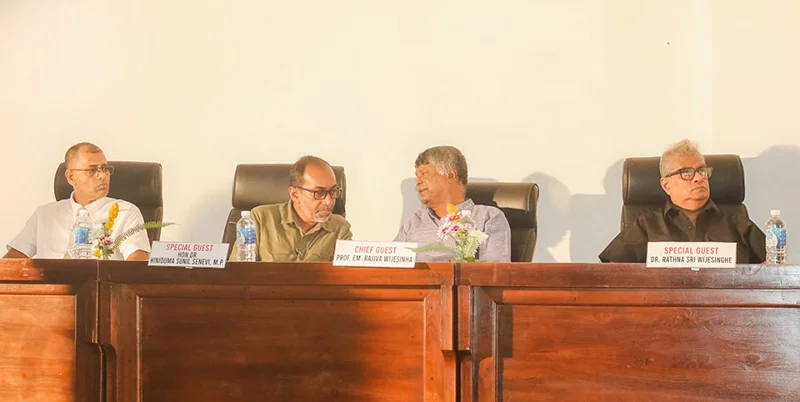
It is said that no man steps into the same river twice, for it is not the same river, and he is not the same man. These words came to mind upon reading Chandana Ruwan Jayanetti’s latest poetry collection, Poems from Galle, which inevitably invites comparison with his earlier work, particularly his first volume of poetry and prose, Reflections in Loneliness: A Collection of Poems and Prose (2015).
In this new collection, Jayanetti is demonstrably not the same poet he was a decade ago. His horizons have widened. his subject matter has diversified, and his thematic range has deepened. The earlier hallmarks of his work, including his empathetic attention to human experience, sensitivity to the natural world, and intimate, reflective tone, remain present. Yet they are now complemented by a stronger defiance, a more deliberate engagement with the political and the cosmic, and a broader mosaic of local and universal concerns. His poetic voice has evolved in scope, tonal range, and thematic ambition.
My own acquaintance with Jayanetti’s poetry dates back to our undergraduate days at Sabaragamuwa University of Sri Lanka, where we were classmates pursuing a BA in Languages (English Special). Even then, his work revealed precise observational skill coupled with profound sympathy for individuals. This early sensibility found fuller articulation in Reflections in Loneliness, a collection spanning nearly two decades of creative endeavor.
That inaugural volume traversed a wide thematic landscape: childhood memories; tender compassion toward humans and animals; tributes to the deserving; the joys and sorrows of young love; and reflections on Sri Lanka’s three-decade Northeast conflict, which concluded in 2009. Jayanetti’s verse, written with sincerity and empathy, moves fluidly from deeply personal to universally human. Moments of striking poignancy include the loss of his wife’s mother, the death of a young friend who marched unflinchingly to the warfront, and the bittersweet parting from a lover.
The prose section of Reflections in Loneliness offered a return to the rural simplicity of the 1970s and ’80s through the perspective of a schoolboy. Essays such as We Buy a Bicycle, Television Descends, The Village Goes to the Fair, Bathing Excursions and Hingurakanda evoke a bygone era with unvarnished authenticity. As literary critic Kamala Wijeratne noted, Jayanetti’s prose merited commendation for its perceptive and affectionate portrayal of rural life, written with the authority of lived experience. His meticulous attention to minute details revealed not only the flaws and frailties of human nature but also its loyalties and quiet virtues, articulated with unforced sympathy.
Consisting of 31 poems and five prose pieces, Reflections in Loneliness established Jayanetti as a writer of elegance, precision, and emotional depth. The current collection, however, confirms the Heraclitean and Buddhist insights: both the poet and his poetry have changed. The new work reflects an expansion from the personal to the cosmic, from the intimately local to the globally resonant, a testament to an artist in motion, carried forward by the ever-changing current of his creative life.
Jayanetti’s poetic corpus in the new book Poems from Galle, spanning thirty-five evocative works from They Heard the Cock Crow to A Birthday Celebration, reveals a profound and consistent artistic signature rooted in themes of humanity, nature, history, and social consciousness. Throughout these poems, Jayanetti demonstrates a distinctive voice that is simultaneously empathetic, contemplative, and alert to the complexities of his Sri Lankan heritage and the broader human condition. While maintaining a core of thematic and tonal consistency, each poem enriches this foundation by expanding into new dimensions of experience, whether personal, ecological, political, or historical.
A foundational element of Jayanetti’s poetry is the intimate relationship between humans and nature, frequently underscored by a deep ethical awareness. In poems like From a Herdman’s Life and My Neighbor, he gives voice to the quiet dignity of rural existence and animal companionship, portraying a symbiotic bond imbued with mutual care and respect. Similarly, Fallen Elephant and Inhumanity lament the cruelty inflicted upon majestic creatures, indicting human greed and violence. These poems articulate not only empathy for the natural world but also an implicit call for stewardship, threading a moral sensibility throughout the collection.
This concern extends to the socio-political sphere, as Jayanetti often situates his poems within the fraught realities of Sri Lanka’s history and struggles. Homage to Sir Henry Pedris honors a national martyr, while Confession of a Sri Lankan Cop exposes institutional corruption and personal integrity in tension. Hanuma Wannama and Gone Are They tackle political violence and social upheaval, reflecting the poet’s engagement with national trauma and collective memory. These works enrich the thematic landscape by connecting personal narrative to larger historical forces.

Jayanetti’s choice of subjects is remarkably diverse yet unified by a focus on lived experience—ranging from the intimate (To a Puppy That Departed, Benji) to the grand (Mekong, A Voyage). The poet’s attention to place, whether the Sri Lankan cityscape in City Morning and Evening from the College Terrace or the historic Ode to Galle Fort, anchors his work in locality while evoking universal themes of time, change, and belonging. Even poems centered on seemingly mundane moments, such as Staff Meeting or A Game, are elevated by the poet’s keen observational eye and capacity to find meaning in everyday rituals.
Moreover, Jayanetti often draws from historical and cultural memory, as seen in Ludowyk Remembered, Let Ho Chi Minh Guide You, and Rathna Sri Remembered, positioning his poetry as a dialogue between past and present. This choice expands his thematic range to include legacy, identity, and the power of remembrance, linking the individual to the collective consciousness.
Across the collection, Jayanetti’s tone is marked by a blend of gentle empathy and quiet strength. Poems such as A Companion Departed and To a Puppy That Departed convey tenderness and mourning with understated poignancy. His voice is intimate and accessible, inviting readers into personal reflections suffused with emotional depth.
Yet, this empathy is balanced by moments of stark realism and defiance.
In Corona and Hanuma Wannama, the tone shifts to urgent and accusatory, critiquing social injustice and political decay. A Ship Weeps mourns environmental devastation with an elegiac voice that is both sorrowful and admonitory. This tonal range reveals a poet capable of both consolation and confrontation, who embraces complexity rather than sentimentality.
While many poems explore specific moments or relationships, others invite contemplation on broader existential and cosmic themes. For instance, A Voyage and Mekong traverse spatial and temporal boundaries, evoking the interplay between human journeys and natural cycles. A Birthday Celebration reflects on legacy, learning, and the continuum of knowledge, blending personal homage with universal insight.
Even poems like A Bond and A Game gesture toward symbolic resonance, the former exploring interspecies loyalty as a metaphor for fidelity and duty, the latter invoking sport as a microcosm of life’s challenges and hopes. These works demonstrate Jayanetti’s ability to expand familiar motifs into metaphoric and philosophical territory, enriching his poetic landscape.
Jayanetti’s thirty-five poems in Poems from Galle collectively reveal a consistent and compelling artistic signature that intertwines compassionate engagement with nature and society, a profound sense of place, and an acute awareness of history and memory. His voice navigates seamlessly between moments of intimate reflection and urgent social commentary, creating a poetic landscape that resonates with both specificity and universality.
Each poem adds a distinct dimension to this mosaic. Historical and political awareness emerges strongly in poems like Let Ho Chi Minh Guide You and Homage to Sir Henry Pedris, where the sacrifices of national heroes and struggles for justice are evoked with reverence and clarity. Meanwhile, environmental consciousness is vividly articulated in works such as Abandoned Chena, Kottawa Forest, and Fallen Elephant, where the fragility of ecosystems and the human impact on nature are poignantly explored.
Jayanetti also delves deeply into themes of personal loss and companionship in poems like Benji, A Companion Departed, and In Memory of Brownie, tenderly capturing the bond between humans and animals. Poems like Confession of a Sri Lankan Cop and Hanuma Wannama offer raw social critique, revealing layers of political and moral complexity.
Through this interplay of historical, environmental, personal, and political themes, Jayanetti constructs a body of work that is distinctly Sri Lankan in its cultural and geographical grounding yet profoundly universal in its exploration of human experience. His poetry invites readers to reflect on the interconnected fates of humans, animals, and the natural world, urging a deeper awareness of our shared existence and responsibilities.
by Saman Indrajith
-

 Sports7 days ago
Sports7 days agoGurusinha’s Boxing Day hundred celebrated in Melbourne
-

 News2 days ago
News2 days agoHealth Minister sends letter of demand for one billion rupees in damages
-

 News5 days ago
News5 days agoLeading the Nation’s Connectivity Recovery Amid Unprecedented Challenges
-

 Features6 days ago
Features6 days agoIt’s all over for Maxi Rozairo
-

 Opinion4 days ago
Opinion4 days agoRemembering Douglas Devananda on New Year’s Day 2026
-

 News6 days ago
News6 days agoDr. Bellana: “I was removed as NHSL Deputy Director for exposing Rs. 900 mn fraud”
-

 News5 days ago
News5 days agoDons on warpath over alleged undue interference in university governance
-

 Features6 days ago
Features6 days agoRebuilding Sri Lanka Through Inclusive Governance


